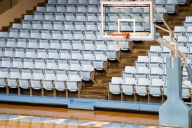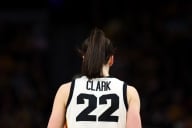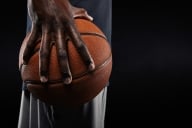You have /5 articles left.
Sign up for a free account or log in.
PHILADELPHIA -- College athletes who hear anti-gay insults or remarks won’t often call it out, even though it’s happening frequently.
At least, that’s according to research presented at the annual NASPA: Student Affairs Administrators in Higher Education conference, where issues of inclusion are particularly popular topics.
Gay athletes, once completely stigmatized in the realm of college sports, have emerged much more prominently, with a record-setting six out football players in the 2017 season across the three National Collegiate Athletic Association divisions.
Still, some of the old prejudices or discomfort around sexuality in athletics seem to linger.
Only a small percentage of athletes -- less than 10 percent -- reported not hearing slurs against lesbian, gay, bisexual, transgender or queer people, according to a study of more than 150 heterosexual athletes conducted in part by Christi McGeorge, professor in the North Dakota State University department of human development and family science. She and Russ Toomey, an associate professor of family studies and human development at the University of Arizona, interviewed players at two NCAA Division I institutions. The survey was about remarks heard while participating in their chosen sports.
Students either didn’t feel the need to defend LGBTQ students, or they did but reported feeling unsure of how to speak up or were fearful they would be attacked for their views, McGeorge found.
In an interview after the NASPA session, a deep dive into some of the data collected on gay athletes, McGeorge said her research shows that it’s not enough that athletes recognize anti-LGBTQ slurs. Institutions must add training around intervening in these cases -- “active bystander” education, she said.
“We're seeing seven in 10 people say, 'I'm hearing anti-LGBT slurs,' but we're also hearing that they're not doing anything about it,” McGeorge said, adding that the problem is not just confined to athletics. Research shows that students across campus aren’t stopping LGBTQ bullying, she said, but the problems are unique and sometimes exacerbated on the playing field.
"Now we need to train them in action," McGeorge said.
McGeorge also asked a series of 75 or so questions to classify whether students were LGBTQ allies -- the students didn’t get to self-identify as supportive to their nonstraight peers. Through her criteria, McGeorge determined that 57 percent of the athletes surveyed were not truly LGBTQ allies -- another 36 percent of athletes were supportive but not visible with their views. Only 7 percent of college players demonstrated they were allies and also shared that view.
The NCAA has done some work on this front. It has sponsored Common Ground, a think tank of both administrators and students from institutions across the board to come up with ideas with improving the experience of LGBTQ athletes, and published “Champions of Respect,” a lengthy report on gay athletes in all divisions.
A fall 2017 survey of NCAA Division III institutions was more optimistic than McGeorge’s data, though attendees noted that administrators and students filled out a survey instead of participating in a study like McGeorge’s. Thus, the results could skew more favorable.
About 80 percent of the administrators and two-thirds of the student athletes in that survey identified as allies of LGBTQ people and 75 percent believed their department or athletics conference was completely free from LGBTQ discrimination.
McGeorge’s presentation also listed several ways to promote an LGBTQ-inclusive athletics department. Among them were having a specific nondiscrimination policy in the athletics department and holding yearly, mandatory training for staffers and on codes of conduct.








